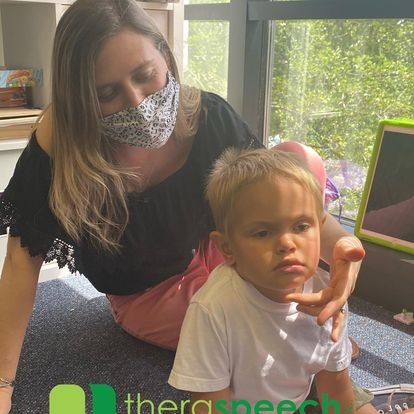Speech-Language Therapy
Our speech-language therapy services are designed to help children communicate effectively and confidently. Our team works with children of all ages to address a variety of speech and language challenges, including articulation disorders, language delays, fluency issues, and social communication skills. Through individualized therapy sessions, we focus on improving essential communication skills to empower children in their everyday interactions.
Overview
Individuals will receive training from certified and licensed speech-language pathologists that hold specializations in treating many different types of disorders. The length of sessions is flexible and will maximize the amount of time necessary in order to make a change.
What We Address
Add your pricing strategy. Be sure to include important details like value, length of service, and why it’s unique.
Goals
The goals of the first sessions are to identify effective instructional techniques that can be used to promote learning for each individual.
Our Approach
We start with a thorough assessment to understand each child’s unique needs.
Through fun, engaging, and structured activities, we help children build confidence in their communication skills. Our therapists work closely with families to support progress at home and reinforce strategies learned in therapy.
Targeted Therapy Plans
Based on the assessment, we create a customized therapy plan with measurable goals.
Improving a child’s communication
Improving speech
Improving language skills
Focused on articulation
Focused on fluency
Overall, it focuses in understanding and expressing language in verbal, nonverbal and written communication.
Parents Involvement
We keep parents involved at every step, offering guidance and resources to support their child’s progress at home.
SLPs treat many types of communication and swallowing problems. These include problems with:
-
how we say sounds and put sounds together into words. Other words for these problems are articulation or phonological disorders, apraxia of speech, or dysarthria.
-
how well we understand what we hear or read and how we use words to tell others what we are thinking. In adults this problem may be called aphasia.
-
how well we read and write. People with speech and language disorders may also have trouble reading, spelling, and writing.
-
how well we follow rules, like taking turns, how to talk to different people, or how close to stand to someone when talking. This is also called pragmatics.
-
how our voices sound. We may sound hoarse, lose our voices easily, talk too loudly or through our noses, or be unable to make sounds.
-
also called stuttering, is how well speech flows. Someone who stutters may repeat sounds, like t-t-t-table, use "um" or "uh," or pause a lot when talking. Many young children will go through a time when they stutter, but most outgrow it.
-
how well our minds work. Problems may involve memory, attention, problem solving, organization, and other thinking skills.
-
how well we suck, chew, and swallow food and liquid. A swallowing disorder may lead to poor nutrition, weight loss, and other health problems. This is also called dysphagia.














